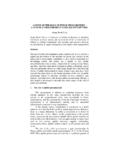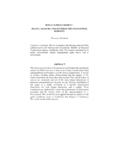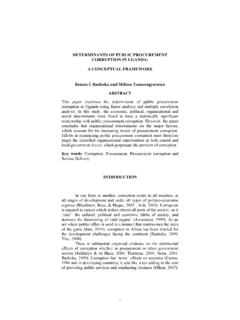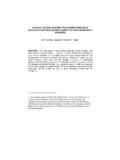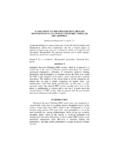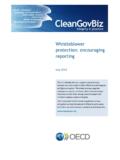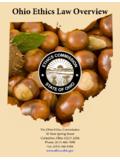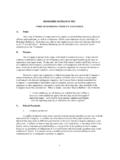Transcription of ‘WHISTLEBLOWERS’ PROTECTION LEGISLATION: …
1 1 WHISTLEBLOWERS PROTECTION legislation : IN SEARCH FOR MODEL FOR NIGERIA Ibrahim Sule Ibrahim Sule, ( , Birmingham; IPD, London) is Barrister and Solicitor in Nigeria. He is with the Nigerian Law School, Kano Campus. His interests are in human rights and health and safety at work law. ABSTRACT Reporting of wrongdoing in private or public organization in the public interest to the authorities concerned known as whistleblowing is globally gaining support. It is no longer strange that some courageous current or former employees or even a member of the public exposes a big financial scandal, mismanagement of public funds or grievous breach of health and safety regulation. The revelation made could be disastrous both to the organization reported and to the person making the report. Ordinarily, because of the existence of the common law duties of trust, loyalty and confidence a whistle-blower could be legitimately dismissed and prosecuted.
2 So many countries are now abandoning this old harsh common law principle in favor of laws protecting whistleblowers against any consequences of their revelation. Among these countries is Nigeria. This paper seeks to test the two bills on whistle-blowing before the Nigerian legislature against the best practices in whistle-blowing. 2 INTRODUCTION Literally, the Cambridge Advanced Learner s Dictionary (2010, online) defined whistle-blowing as [causing] something bad that someone is doing to stop, especially by bringing it to the attention of other people . A whistle-blower on the other hand has been defined by the Oxford Advanced Learner s Dictionary (2005, online) as a person who informs people in authority or the public that the company they work for is doing [something] wrong or illegal. Legally speaking however, there may not be a universally acceptable definition of the term because of the uncertainties surrounding it.
3 It has been recently defined as the reporting of a wrongdoing that needs to be corrected or terminated in order to protect public interest (Asian Institute of Management 2006, p 15). Lewis (2001) quoting the Australian Senate Select Committee told us that what is important is not the definition of the term but the definition of the circumstances and conditions under which the employees who disclose wrong-doing are entitled to PROTECTION from retaliation. Nevertheless, a working definition for the purpose of this article may be important. Guy Dehn a renown public accountability expert (Testimony of Guy Dehn, 2003) defined whistle-blowing as: ..a colloquial term usually applied to the raising of concerns by one member of an organization about the conduct or competence of another member of the same organization or about the activities of the organization itself Gilan (2003, p.)
4 37 quoting Latimer, quoting Cripps 1986, p. 257) defined whistle-blowing as passing on information from a conviction that it should be passed on despite (not because of) the embarrassment it could cause to those implicated . Recently it has been defined as a culture that encourages the challenge of inappropriate behavior at all levels (Getting the Balance Right, 2005, Cm 2407). It may also be synonymous with the culture of raising concern by a member of staff about a wrongdoing or misdeed taking place in his place of work (Shipman s Inquiry (b) 2005, para. ). Whistle-blowers are persons (usually workers) who at their own risk, having been motivated by a sense of personal, and/or public duty, may expose what they perceive as specific instances of wrongdoing , which may be within the private and/or public sector (Gilan, p. 37). It 3 may also involve speaking out publicly or to the authorities concerned about any wrongdoing , financial, administrative or regulatory which may harm members of the public taking place in an organization either private or public, by a current or ex-employee of that organization - or even by a member of the public who does not have any relationship with that organization.
5 The wrongdoing may range from financial scandal or cheat, corruption or mismanagement to health and safety issues that may bring about the decline or total collapse of the organization or an immeasurable danger to the public, if necessary steps are not taken. Some Conceptual elements: Amid some disagreements in the early 80s on what exactly constitutes whistle-blowing Robert and Kraft (1990, pp. 849-874, quoted in Asian Institute of Management) identified some conceptual elements to clarify some of the cloudy areas of whistle blowing. They identified the following: a. An individual: To them the person reporting or disclosing the wrongdoing can be an employee or ex-employee of that organization, not a journalist or even ordinary member of the society. Nevertheless, as reflected in some legislations the current trends shifts towards considering any person a whistleblower by his/her actions - and he/she must not be registered or identified with any organization(Whistleblowers Australia).
6 This seems to be confusing (Brown, (Ed), 2008). b. Information which is of public record: As opposed other dissenters in an organization whistleblowers expect that the information they disclose in public interest should publically and openly be utilized by the public. They expect the recipient to further disclose the information in public interest. c. Information about actual or serious wrongdoing : The information must also be about a wrongdoing threatening the wellbeing of the public and not a trivial one. Regard being had to the number of those affected, the seriousness of the consequences and even the amount of money or loss involved. 4 The good and the bad side of whistle-blowing: A potential whistle-blower who sees a wrong doing being carried out in an organization has four risky options. Firstly, he may decide to keep silent for fear of dismissal or that he will be called names, or that his family may be targeted.
7 However, his silence may cause grave disaster to the public at large. Secondly, he may decide to blow the whistle internally so that those in charge of the organization are put on the alert to take the appropriate measure to avert or avoid the risk. This is particularly if the employee belongs to organization encouraging the culture of raising concern about wrong doing. Thirdly, he may decide to let everybody know by blowing the whistle outside; for instance by alerting the media. This may be the most dangerous cause as the employee may likely lose his job at the end of the drama for ethical or legal reasons. As Calland and Dehn (2004, p. 7) pointed out, until recently most legal systems do not protect such disclosures even if made in good faith. Fourthly, the employee may anonymously blow the whistle internally or outside; for instance by leaking the information to those in more senior positions or to the media.
8 However, this makes the wrongdoing difficult to investigate as there could be no one to clarify on the matters raised. It is to be noted that, two things are indisputably true about whistle-blowing: the first is that it is a risky business (Vickers, 1997, ) and the second is that it is a helpful practice. It is a risky business because of the dangers, the detriment and threats awaiting an employee who courageously decides to say enough is enough to the wrongdoing of either his co-workers or his employers. Whistleblowers could commonly face discipline or dismissal (Vickers) because they are being seen as particular threat to, and thorn in the side of, an employing organization (Bowers and Lewis, 1996 p. 637). They may also earn more negative labels such as informants, snitches, rats, squabbles, sneaks, or stoolies (Gilan, p.)
9 38) which could have impact on them or their families. A potential whistleblower with a genuine case may prepare to be silent rather than reporting the matter to the authorities for fear of being seen as troublemaker or maverick or for fear of recriminations and feeling of impotence in the belief that, even if the report is made, nothing will be done about it (Shipman s Inquiry (b) para. ). He may also have a fear that having blown the whistle he might end up in being prosecuted or got an action for defamation. There may also be a fear that the report he made about the misdeed may be interpreted as an attack on an individual or body (Shipman s Inquiry (b). There can also be a fear that members of the group which the person 5 belongs will gather against the whistleblower to ostracize him or members of his family. All these are indisputably true about whistle-blowing and they usually happen.
10 This is because the consequences of whistle-blowing could cause embarrassments and financial loss to many persons and organizations; although of course it could prevent a great disaster or harm befalling on the general public or large number of innocent people. For these and other dangers, a potential whistleblower will be moved to engage in balancing and weighing between the effect and impact of what he is going to reveal and the dangers to his life and livelihood and to his family, refutation and profession. A study of whistleblowers in the US in the year 2000 (Irish Times) found out that 100% of those who blew whistle were fired and most of them were unable to find new jobs. 17% lost their homes; 54% were harassed by peers at workplaces; 15% were subsequently divorced; 80% suffered physical deterioration; 90% reported emotional stress, depression and anxiety and sadly, 10% of them attempted suicide.

